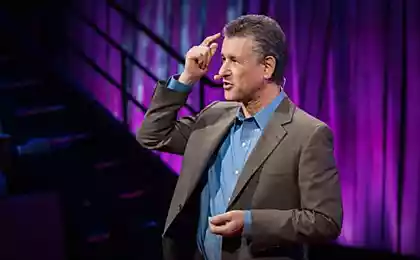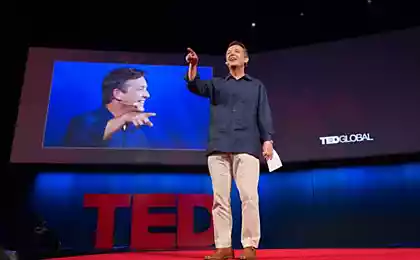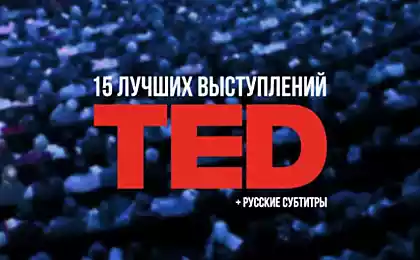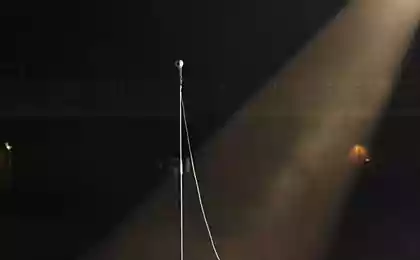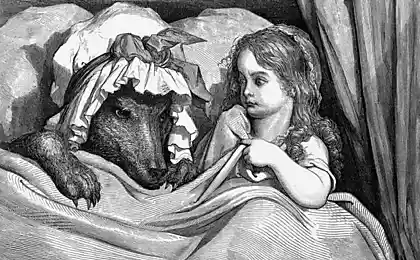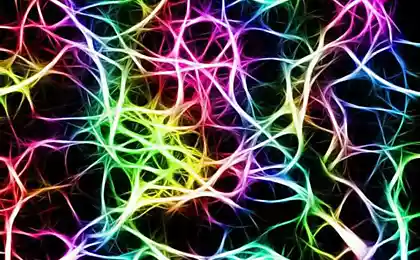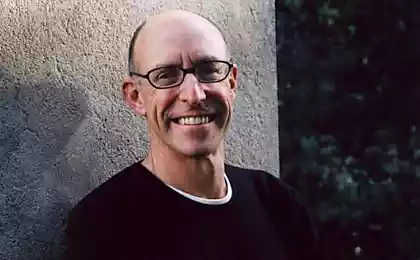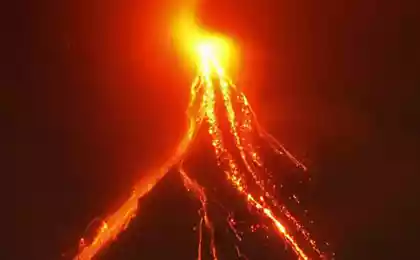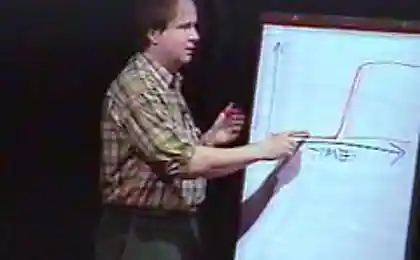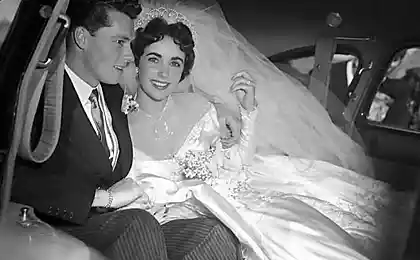616
Elizabeth Gilbert: Your elusive genius
Elizabeth Gilbert muses on the excessive expectations in relation to creative people and geniuses and shares the idea that it is not rare that the man is a genius, and everyone has a genius. Funny and touching speech.
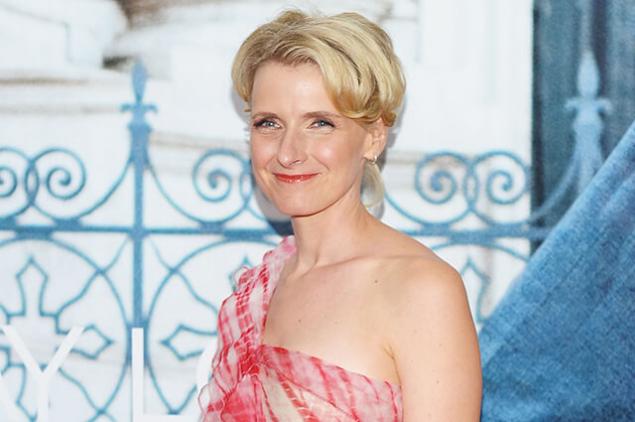
I am a writer Writing books is my profession, but, of course, is much more than just a profession I dearly love their job. Don't expect any time in the future this will change. But recently something special happened in my life and in my career that forced me to completely rethink my relationship with my work. And this special is that I recently released the book "Eat, pray, love". She was deliberately unlike all my previous books. She went and became crazy, sensational, international bestseller. With the result that wherever I go, people treat me like a leper. Seriously! For example, they come to me, all worried, and asked: "aren't you afraid — aren't you afraid that you will never be able to do something better? What are you going to write the rest of my life, but never create a book that would be as important to people on earth? Never? Never?"
https://embed.ted.com/talks/lang/ru/elizabeth_gilbert_on_genius
Very reassuring, isn't it? But much worse I would not I remember that about 20 years ago, when I was a teenager and when I first started telling people that I want to be a writer. I met the reaction of the same kind. The people said, "aren't You afraid that you'll never succeed?" Aren't you afraid the humiliation of rejection will kill you? What are you going to work your whole life, but in the end nothing will happen and you will die, be buried unfulfilled dreams, filled with failure and disappointment?" (Laughter) And so on.
The answer, the short answer to all these questions is "Yes". Of course I'm afraid of all these things. I always have been. And I'm afraid of so many things that people don't realize. For example, algae and other horrors. But when it comes to writing, there is a problem, which I think more recently, and wonder why this is the case in this way.
In fact, do it rationally? Is it logical to be afraid of the work, for which people, how they feel, what they are? You know, there's something very special about creative people that seem to makes us very concerned about their mental health, which can not be found in other human activities. For example, my father was a chemical engineer.
I do not recall a single case in his entire forty-year career, someone asked him if he was afraid to be a chemical engineer? "This activity does not torment you? If all you manage to do that?"I never have been. I must admit that chemical engineers in General, for all the years of its existence, did not deserve the reputation of alcohol addicted people maniacs, prone to depression.(Laughter)
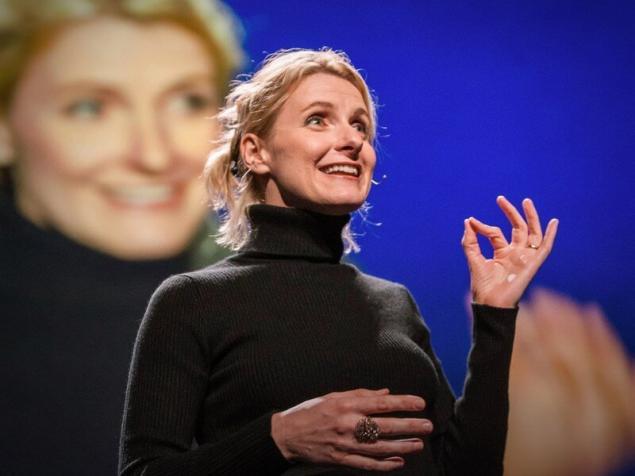
We writers have a reputation of that kind. And not only writers, but creative people seem to be firmly established reputation pretty mentally unstable. It is enough to look at the long report on the deaths of bright creative people 20th century alone, those who died young and often in suicide. And even those who did not commit suicide literally was eventually finished off by a private gift.
Norman mailer, just before he died he said: "Each of my books is slowly killing me." A very unusual statement about his life's work. But we don't even flinch when we hear something like that, because I heard it hundreds of times and have already realized and accepted the idea that creativity and suffering are somehow interrelated, and the art is in the end always leads to the flour.
The question I want to ask today: do You all agree with this idea? Do you agree? Because it looks like I agree, or close to that. And I absolutely do not agree with this assumption. I think it's terrible, and dangerous. And I don't want to see it perpetuated into the next century. I think it's better if we encourage our great creative minds to live as long as possible.
I know exactly about myself that would be very dangerous to go down this dark road, given all the circumstances in my career. (kind of the tipping point) I'm fairly young, only 40 years old. I am able to work even, perhaps, 40 years. And it's exceedingly likely that anything I write from this point forward, will be evaluated in the world, where already published one of my book that had such freakish success. I'll tell you straight — here there is a trusting atmosphere —it is very likely that my greatest success is behind me. God, what a thought! That's the kind of thought that could lead a person to start drinking gin at 9 o'clock in the morning. And I don't want to go. (Laughter) I prefer to do a job that I love
However, the question is how? And the result of long reflections about how I should work to continue to write, I came to the conclusion that I should make some sort of protective psychological structure that I need to find some acceptable distanceyou myself as a person writing and my very natural fear of what reaction can cause my work from now on. And I was looking for a role model for such a task. And I looked narrowly to different times in human history and different societies to make sure that someone approached this task it is wiser and better than we are. To the problem of how to help creative people overcome the emotional risks inherent creative abilities.
My search led me to Ancient Rome and Ancient Greece. So stay with me, because it will make the loop in time. The ancient Greeks and Romans believed that creativity is a human feature. People believed that creativity is the spirit and the companion of the divine, and that they come to us from some distant and unknown sources for obscure, unknown reasons. The Greeks famously called these divine attendant spirits of creativity "daemons." Socrates believed that he had a daemon who spoke wisdom to him from afar. The Romans had the same idea but they called that sort of disembodied creative spirit a genius. And it's great, because the Romans did not think that genius is some gifted individual. They believed that a genius is a kind of magical essence that lived, literally, within the walls of the house of the Lord, a kind of Dobby who came and invisible way, helped the artist with his work, and formed the results of this work.
Amazing — this is the distance, which I mentioned, and which I was looking for a psychological construct to protect you from the results of your work. And everyone knew how it works, right? So the ancient artist was protected from certain things, such as narcissism. If your work was excellent, you could not entirely take on the laurels of its creation. Everyone knew that you helped a genius. If your work was bad, everyone knew that you're a genius cripple. And that's the way Western people thought about the creative abilities for a long time.
And then the Renaissance came and everything changed and there was a big new idea that the individual should be the center of the universe, beyond the gods and miracles, and there are no more places of mystical beings who hear the divine call and write under his dictation. Thus began a rational humanism. And people began to think that creativity originates in man.For the first time since the beginning of the story we heard about a man began to say "he's a genius," not "having a genius".
And I can tell you that it was a huge mistake. You know, it allowed people to think that he or she is the vessel, the source of all divine, creative, the unknown, the mystical, that is too much responsibility for the fragile human psyche. It's like asking somebody to swallow the sun. This completely warps and distorts egos and creates all these unmanageable expectations about performance of a person. And I think it was the load that has been killing off artists for the last 500 years.
And if so, I believe that this is so, the question arises, what next? Can we act otherwise? It may be wise to return to the ancient understanding about the relationship between humans and the creative mystery. Maybe not. Maybe we don't just erase 500 years of rational humanistic approach in one vosemnadcatiletnij speech. And in the audience there are probably people who are subjected to serious scientific doubt on the existence, in General, fairies who follow the person and give him the work of fairy dust and stuff like that. I'm not going to convince you of this.
But the question I wanted to ask, why not? Why not think this way? Because it makes almost more sense than any other I know of concepts as an explanation for the insane of the capriciousness of the creative process. The process, which, as knows anyone who has ever tried to create, that is, each of us, a process that is not always rational. And sometimes feel downright paranormal.
Recently I met an extraordinary American poet Ruth stone. She is now 90, and she was a poet all my life, and she told me that when she grew up in a rural area in Virginia, and when she worked in the fields, she heard and felt the poetry that came to her from nature. And she said it was like a thunderous train of air. And it seems to have come to her from the depths of the landscape. And she felt it coming, because the earth shook under her feet.And she knew exactly what to do. Her words: "to run headlong".
And she ran headlong into the house, the house she was overtaken by the poem, and had to find paper and a pencil fast enough to have time to write that erupted through her, in time to catch and record on paper.And sometimes she didn't move fast enough. She ran and ran, but did not get home, and a poem rolled through her and disappeared over the horizon in search of, as Ruth put it, another poet. And other times, I'll never forget, she said, there were moments when she would almost miss his poem. And so she ran into the house and searched the paper, and the poem passed through her.
Ruth took a pencil this time, and then there was a feeling like she might catch this poem his other hand and catch it, catch the poem by the tail, and bring it back to his body while she tried to capture a poem on paper. In such cases, the poem came out perfect, but written backwards. (Laughter)
When I heard this, I thought, "it's Amazing what my creative process looks exactly like that." (Laughter)
This is not all what my creative process, I'm not an endless source of inspiration! I'm a mule, and the way in which I go, is that I have to Wake up at about the same time each day, and work up a sweat. But even I, with all my stubbornness, faced with such a phenomenon. As I think many of you. Even came ideas from a source that I honestly cannot identify. What is the source? And as we all work with that source and not to lose our minds, but it is still better to keep it as long as possible?
The best modern example for me is the musician Tom waits, who I had the opportunity to interview on behalf of a magazine a few years ago. We talked about it, and after That the greater part of his life is literally embodied torn by doubts of an artist trying to gain control over all these uncontrollable creative impulses that would have belonged to him.
Then he got older and calmer, and one day he was driving down the freeway in Los Angeles, and something happened that changed everything. He was driving and suddenly heard a little snippet of a melody. A fragment came to his mind, as usual, elusive and seductive, and Tom wants this piece. He's amazing, Tom is eager to get to this fragment, but he had no such opportunity. He has no pens, no paper, no recording device,
And he usually begins to worry: "I will forget I lose it now, and the memory of that thing's gonna haunt me forever, I'm not good enough, I can't do it." And instead of panicking, he just stopped. He just stopped that whole mental process and he did something new. He looked up at the sky and said, "Excuse me, can't you see I'm driving?" (Laughter)"Do I look like I can record a song right now? If you really want to come to light, come at a more appropriate time when I can take care of you. Otherwise, go bother somebody else today. Go to Leonard Cohen".
And his whole work process changed after that. Not work, work was still oftentimes as dark as ever. But the process, and severe anxiety associated with it passed as soon as he learned of the genius of himself, where it caused nothing but inconvenience, and released it where this genius came from, and realized that the genius did not need to be inside, and to torment its owner. And maybe without, and with it you can achieve weird and wonderful interaction. Some kind of dialogue between Tom and this strange thing that, in General, is not Tom.
When I heard this story, it started to shift something in my working method, and once it saved me. This idea saved me when I was writing "Eat, pray, love", and fell into the kind of despair we fall into when working on something, and it does not work. You start to think that this is a disaster that this would be the worst-written books.
Not just bad, but worst. And I was beginning to think I should just give it up. But then I remembered Tom talking to the open air and I tried it. I raised my head from rukopisei I directed my comments to an empty corner of the room. I said loudly: "Look, you and I both know that if this book isn't brilliant that is not entirely my fault, right? Because I put all of myself into it. And more I can not offer.
So if you want to be better, you'd like to make a contribution to the common cause. OK. But if you don't, then the hell with you. I'm going to write anyway because that's my job. I just wanted to publicly declare that I am its part of the job." (Laughter)
Because -- (Applause) In the end, centuries ago in the deserts of North Africa, people gathered and organized dances under the moon, and the music lasted for hours and hours, until dawn. And they were amazing because the dancers were professionals. They were beautiful, right? But sometimes, very rarely, happened something amazing, and one of these performers would actually become transcendent. And I know you know what I'm talking about, because I know you all have seen a performance like this. If time has stopped, and the dancer stepped into the unknown, into the portal and although it did nothing new, nothing that he did for 1000 nights before, all suddenly began to Shine. Suddenly, he ceased to be merely human. It was lit by the fire of the divine.
And when this happened, people knew it, and called it by name. They put their hands together and began to chant, "Allah, Allah, Allah, God, God, God." Is God. A curious historical note. When the Moores invaded southern Spain, they brought with them this custom. Over time the pronunciation changed from "Allah, Allah, Allah" to "OLE, OLE, OLE." And that's what you hear during bull fights and flamenco dancing in Spain, when a performer has done something impossible and incredible. "Allah, OLE, OLE, Allah, amazing, Bravo." When a person does something unfathomable is the glory of God. And that's great, because we needed it.
But a curious thing happens the next morning when the dancer wakes up and discovers on Tuesday at 11 am that he is no longer a spark of God, that he is only a man whose knees hurt, and he may never rise to such heights. And maybe no one else will remember the name of God when he dances. and what is he then to do the rest of his life? It's hard. This is one of the most painful reconciliations to make in a creative life. But, perhaps, such moments will not be so painful if you didn't believe the most amazing and magical to us comes from ourselves. What is given to us in a loan to you from some unimaginable source for some period of your life, and to be passed along when you complete the job. And, you know, if you think so, then that changes everything.
I'm beginning to think so, and I thought that for the last few months while I worked on my new book which will be published soon. The release is filled with sverhozhirenie I still frightening success.
Irina Khakamada: the Extra money take energyIf a woman wants sex she has low self esteem
And all I keep telling myself when I start to get nervous about it. Hey, don't worry. Don't be discouraged.Just do your job. Keep doing your part, whatever it is. If your job is to dance, do your dance. If divine, spontaneous genius that accompanies you wish to illuminate you with his presence, only for a brief moment, then "olé!" And if not — keep on dancing. And "Ola" for you, anyway. I believe this and I feel that we all have to learn this attitude. "Ola," in any case, the fact that you had perseverance and love to continue to do their job.published
Source: www.ted.com/talks/elizabeth_gilbert_on_genius/transcript?language=ru

I am a writer Writing books is my profession, but, of course, is much more than just a profession I dearly love their job. Don't expect any time in the future this will change. But recently something special happened in my life and in my career that forced me to completely rethink my relationship with my work. And this special is that I recently released the book "Eat, pray, love". She was deliberately unlike all my previous books. She went and became crazy, sensational, international bestseller. With the result that wherever I go, people treat me like a leper. Seriously! For example, they come to me, all worried, and asked: "aren't you afraid — aren't you afraid that you will never be able to do something better? What are you going to write the rest of my life, but never create a book that would be as important to people on earth? Never? Never?"
https://embed.ted.com/talks/lang/ru/elizabeth_gilbert_on_genius
Very reassuring, isn't it? But much worse I would not I remember that about 20 years ago, when I was a teenager and when I first started telling people that I want to be a writer. I met the reaction of the same kind. The people said, "aren't You afraid that you'll never succeed?" Aren't you afraid the humiliation of rejection will kill you? What are you going to work your whole life, but in the end nothing will happen and you will die, be buried unfulfilled dreams, filled with failure and disappointment?" (Laughter) And so on.
The answer, the short answer to all these questions is "Yes". Of course I'm afraid of all these things. I always have been. And I'm afraid of so many things that people don't realize. For example, algae and other horrors. But when it comes to writing, there is a problem, which I think more recently, and wonder why this is the case in this way.
In fact, do it rationally? Is it logical to be afraid of the work, for which people, how they feel, what they are? You know, there's something very special about creative people that seem to makes us very concerned about their mental health, which can not be found in other human activities. For example, my father was a chemical engineer.
I do not recall a single case in his entire forty-year career, someone asked him if he was afraid to be a chemical engineer? "This activity does not torment you? If all you manage to do that?"I never have been. I must admit that chemical engineers in General, for all the years of its existence, did not deserve the reputation of alcohol addicted people maniacs, prone to depression.(Laughter)

We writers have a reputation of that kind. And not only writers, but creative people seem to be firmly established reputation pretty mentally unstable. It is enough to look at the long report on the deaths of bright creative people 20th century alone, those who died young and often in suicide. And even those who did not commit suicide literally was eventually finished off by a private gift.
Norman mailer, just before he died he said: "Each of my books is slowly killing me." A very unusual statement about his life's work. But we don't even flinch when we hear something like that, because I heard it hundreds of times and have already realized and accepted the idea that creativity and suffering are somehow interrelated, and the art is in the end always leads to the flour.
The question I want to ask today: do You all agree with this idea? Do you agree? Because it looks like I agree, or close to that. And I absolutely do not agree with this assumption. I think it's terrible, and dangerous. And I don't want to see it perpetuated into the next century. I think it's better if we encourage our great creative minds to live as long as possible.
I know exactly about myself that would be very dangerous to go down this dark road, given all the circumstances in my career. (kind of the tipping point) I'm fairly young, only 40 years old. I am able to work even, perhaps, 40 years. And it's exceedingly likely that anything I write from this point forward, will be evaluated in the world, where already published one of my book that had such freakish success. I'll tell you straight — here there is a trusting atmosphere —it is very likely that my greatest success is behind me. God, what a thought! That's the kind of thought that could lead a person to start drinking gin at 9 o'clock in the morning. And I don't want to go. (Laughter) I prefer to do a job that I love
However, the question is how? And the result of long reflections about how I should work to continue to write, I came to the conclusion that I should make some sort of protective psychological structure that I need to find some acceptable distanceyou myself as a person writing and my very natural fear of what reaction can cause my work from now on. And I was looking for a role model for such a task. And I looked narrowly to different times in human history and different societies to make sure that someone approached this task it is wiser and better than we are. To the problem of how to help creative people overcome the emotional risks inherent creative abilities.
My search led me to Ancient Rome and Ancient Greece. So stay with me, because it will make the loop in time. The ancient Greeks and Romans believed that creativity is a human feature. People believed that creativity is the spirit and the companion of the divine, and that they come to us from some distant and unknown sources for obscure, unknown reasons. The Greeks famously called these divine attendant spirits of creativity "daemons." Socrates believed that he had a daemon who spoke wisdom to him from afar. The Romans had the same idea but they called that sort of disembodied creative spirit a genius. And it's great, because the Romans did not think that genius is some gifted individual. They believed that a genius is a kind of magical essence that lived, literally, within the walls of the house of the Lord, a kind of Dobby who came and invisible way, helped the artist with his work, and formed the results of this work.
Amazing — this is the distance, which I mentioned, and which I was looking for a psychological construct to protect you from the results of your work. And everyone knew how it works, right? So the ancient artist was protected from certain things, such as narcissism. If your work was excellent, you could not entirely take on the laurels of its creation. Everyone knew that you helped a genius. If your work was bad, everyone knew that you're a genius cripple. And that's the way Western people thought about the creative abilities for a long time.
And then the Renaissance came and everything changed and there was a big new idea that the individual should be the center of the universe, beyond the gods and miracles, and there are no more places of mystical beings who hear the divine call and write under his dictation. Thus began a rational humanism. And people began to think that creativity originates in man.For the first time since the beginning of the story we heard about a man began to say "he's a genius," not "having a genius".
And I can tell you that it was a huge mistake. You know, it allowed people to think that he or she is the vessel, the source of all divine, creative, the unknown, the mystical, that is too much responsibility for the fragile human psyche. It's like asking somebody to swallow the sun. This completely warps and distorts egos and creates all these unmanageable expectations about performance of a person. And I think it was the load that has been killing off artists for the last 500 years.
And if so, I believe that this is so, the question arises, what next? Can we act otherwise? It may be wise to return to the ancient understanding about the relationship between humans and the creative mystery. Maybe not. Maybe we don't just erase 500 years of rational humanistic approach in one vosemnadcatiletnij speech. And in the audience there are probably people who are subjected to serious scientific doubt on the existence, in General, fairies who follow the person and give him the work of fairy dust and stuff like that. I'm not going to convince you of this.
But the question I wanted to ask, why not? Why not think this way? Because it makes almost more sense than any other I know of concepts as an explanation for the insane of the capriciousness of the creative process. The process, which, as knows anyone who has ever tried to create, that is, each of us, a process that is not always rational. And sometimes feel downright paranormal.
Recently I met an extraordinary American poet Ruth stone. She is now 90, and she was a poet all my life, and she told me that when she grew up in a rural area in Virginia, and when she worked in the fields, she heard and felt the poetry that came to her from nature. And she said it was like a thunderous train of air. And it seems to have come to her from the depths of the landscape. And she felt it coming, because the earth shook under her feet.And she knew exactly what to do. Her words: "to run headlong".
And she ran headlong into the house, the house she was overtaken by the poem, and had to find paper and a pencil fast enough to have time to write that erupted through her, in time to catch and record on paper.And sometimes she didn't move fast enough. She ran and ran, but did not get home, and a poem rolled through her and disappeared over the horizon in search of, as Ruth put it, another poet. And other times, I'll never forget, she said, there were moments when she would almost miss his poem. And so she ran into the house and searched the paper, and the poem passed through her.
Ruth took a pencil this time, and then there was a feeling like she might catch this poem his other hand and catch it, catch the poem by the tail, and bring it back to his body while she tried to capture a poem on paper. In such cases, the poem came out perfect, but written backwards. (Laughter)
When I heard this, I thought, "it's Amazing what my creative process looks exactly like that." (Laughter)
This is not all what my creative process, I'm not an endless source of inspiration! I'm a mule, and the way in which I go, is that I have to Wake up at about the same time each day, and work up a sweat. But even I, with all my stubbornness, faced with such a phenomenon. As I think many of you. Even came ideas from a source that I honestly cannot identify. What is the source? And as we all work with that source and not to lose our minds, but it is still better to keep it as long as possible?
The best modern example for me is the musician Tom waits, who I had the opportunity to interview on behalf of a magazine a few years ago. We talked about it, and after That the greater part of his life is literally embodied torn by doubts of an artist trying to gain control over all these uncontrollable creative impulses that would have belonged to him.
Then he got older and calmer, and one day he was driving down the freeway in Los Angeles, and something happened that changed everything. He was driving and suddenly heard a little snippet of a melody. A fragment came to his mind, as usual, elusive and seductive, and Tom wants this piece. He's amazing, Tom is eager to get to this fragment, but he had no such opportunity. He has no pens, no paper, no recording device,
And he usually begins to worry: "I will forget I lose it now, and the memory of that thing's gonna haunt me forever, I'm not good enough, I can't do it." And instead of panicking, he just stopped. He just stopped that whole mental process and he did something new. He looked up at the sky and said, "Excuse me, can't you see I'm driving?" (Laughter)"Do I look like I can record a song right now? If you really want to come to light, come at a more appropriate time when I can take care of you. Otherwise, go bother somebody else today. Go to Leonard Cohen".
And his whole work process changed after that. Not work, work was still oftentimes as dark as ever. But the process, and severe anxiety associated with it passed as soon as he learned of the genius of himself, where it caused nothing but inconvenience, and released it where this genius came from, and realized that the genius did not need to be inside, and to torment its owner. And maybe without, and with it you can achieve weird and wonderful interaction. Some kind of dialogue between Tom and this strange thing that, in General, is not Tom.
When I heard this story, it started to shift something in my working method, and once it saved me. This idea saved me when I was writing "Eat, pray, love", and fell into the kind of despair we fall into when working on something, and it does not work. You start to think that this is a disaster that this would be the worst-written books.
Not just bad, but worst. And I was beginning to think I should just give it up. But then I remembered Tom talking to the open air and I tried it. I raised my head from rukopisei I directed my comments to an empty corner of the room. I said loudly: "Look, you and I both know that if this book isn't brilliant that is not entirely my fault, right? Because I put all of myself into it. And more I can not offer.
So if you want to be better, you'd like to make a contribution to the common cause. OK. But if you don't, then the hell with you. I'm going to write anyway because that's my job. I just wanted to publicly declare that I am its part of the job." (Laughter)
Because -- (Applause) In the end, centuries ago in the deserts of North Africa, people gathered and organized dances under the moon, and the music lasted for hours and hours, until dawn. And they were amazing because the dancers were professionals. They were beautiful, right? But sometimes, very rarely, happened something amazing, and one of these performers would actually become transcendent. And I know you know what I'm talking about, because I know you all have seen a performance like this. If time has stopped, and the dancer stepped into the unknown, into the portal and although it did nothing new, nothing that he did for 1000 nights before, all suddenly began to Shine. Suddenly, he ceased to be merely human. It was lit by the fire of the divine.
And when this happened, people knew it, and called it by name. They put their hands together and began to chant, "Allah, Allah, Allah, God, God, God." Is God. A curious historical note. When the Moores invaded southern Spain, they brought with them this custom. Over time the pronunciation changed from "Allah, Allah, Allah" to "OLE, OLE, OLE." And that's what you hear during bull fights and flamenco dancing in Spain, when a performer has done something impossible and incredible. "Allah, OLE, OLE, Allah, amazing, Bravo." When a person does something unfathomable is the glory of God. And that's great, because we needed it.
But a curious thing happens the next morning when the dancer wakes up and discovers on Tuesday at 11 am that he is no longer a spark of God, that he is only a man whose knees hurt, and he may never rise to such heights. And maybe no one else will remember the name of God when he dances. and what is he then to do the rest of his life? It's hard. This is one of the most painful reconciliations to make in a creative life. But, perhaps, such moments will not be so painful if you didn't believe the most amazing and magical to us comes from ourselves. What is given to us in a loan to you from some unimaginable source for some period of your life, and to be passed along when you complete the job. And, you know, if you think so, then that changes everything.
I'm beginning to think so, and I thought that for the last few months while I worked on my new book which will be published soon. The release is filled with sverhozhirenie I still frightening success.
Irina Khakamada: the Extra money take energyIf a woman wants sex she has low self esteem
And all I keep telling myself when I start to get nervous about it. Hey, don't worry. Don't be discouraged.Just do your job. Keep doing your part, whatever it is. If your job is to dance, do your dance. If divine, spontaneous genius that accompanies you wish to illuminate you with his presence, only for a brief moment, then "olé!" And if not — keep on dancing. And "Ola" for you, anyway. I believe this and I feel that we all have to learn this attitude. "Ola," in any case, the fact that you had perseverance and love to continue to do their job.published
Source: www.ted.com/talks/elizabeth_gilbert_on_genius/transcript?language=ru
